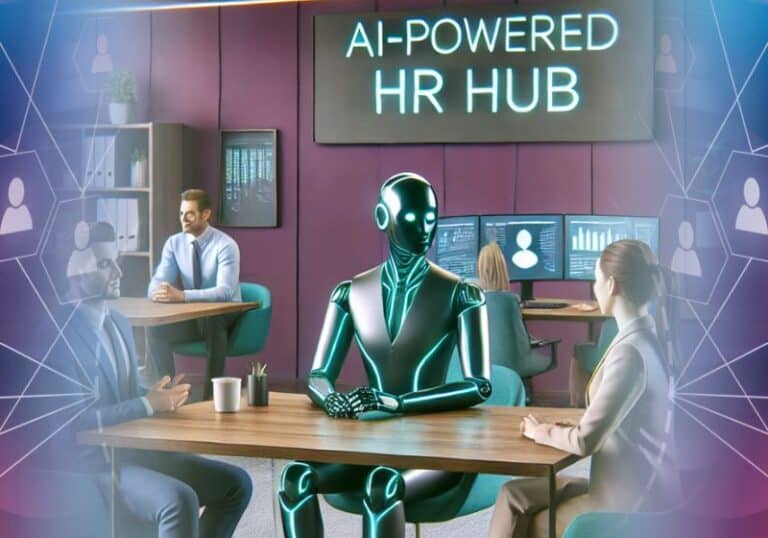Top Tips for introducing AI in the Workplace

In the dawning age of workplace digitalisation, Artificial Intelligence (AI) has emerged as a revolutionary force. From automating mundane tasks to providing predictive analytics, AI promises to reshape the UK workplace. However, with great technology comes great responsibility, particularly in the realm of legal compliance and ethical considerations. As employers in the UK explore the frontiers of AI, understanding the legal landscape is crucial.
AI and Recruitment: Fairness in Algorithms
One of the primary applications of AI in the workplace is recruitment. AI can screen CVs, predict candidate suitability, and even conduct initial interviews. The legal implications here are tied to the Equality Act 2010, which protects job applicants from discrimination. Employers must ensure that their AI tools do not inadvertently perpetuate bias against protected characteristics such as age, race, gender, or disability.
Key Consideration: Regularly audit AI recruitment tools for biases and ensure they are programmed to adhere to equality legislation.
Data Protection: AI’s Appetite for Information
AI systems are data-hungry beasts. The General Data Protection Regulation (GDPR), as incorporated into UK law by the Data Protection Act 2018, governs the use of personal data. Employers must be transparent about how they use AI to process employee data and need explicit consent for certain uses. Data impact assessments are a must, ensuring that AI systems comply with privacy standards and do not overstep their bounds.
Key Consideration: Implement strict data governance frameworks that align AI operations with GDPR requirements.
Intellectual Property: Who Owns Created Content?
As artificial Intelligence systems create reports, designs, or code, the question of intellectual property (IP) arises. In the UK, the Copyright, Designs and Patents Act 1988 may not fully account for AI creations. Typically, IP rights are assigned to human authors, but AI complicates this notion. Employers must navigate uncharted waters to determine the ownership of AI-generated work.
Key Consideration: Establish clear IP policies and contracts that address AI-generated content to avoid future disputes.
Liability: When AI Goes Awry
AI, while efficient, is not infallible. When AI errors lead to financial loss or damage, liability issues surface. Employers must consider who is responsible—the AI developer, the user, or the AI itself? Current UK laws do not recognise AI as a legal entity, thus the onus falls on the employer to ensure proper AI implementation and oversight.
Key Consideration: Have robust risk management strategies and ensure systems are well within the operational control of human supervisors.
Automation and the Workforce: The Human Cost
The risk of job displacement due to AI is a sensitive legal and ethical issue. Employers must consider the Employment Rights Act 1996 when restructuring or making roles redundant. Ensuring fair consultation processes and considering redeployment or retraining options is vital.
Key Consideration: Develop a transition plan that includes employee retraining and support for those affected by AI-related changes.
Cybersecurity: Protecting the Digital Frontier
AI enhances cybersecurity but also presents new risks. Employers must safeguard against cyber threats under laws like the Network and Information Systems Regulations 2018. Failure to protect data can lead to substantial fines and reputational damage.
Key Consideration: Invest in cybersecurity measures that encompass AI systems and regularly update them to tackle evolving threats.
Ethical Considerations: Beyond Legal Compliance
While not strictly legal, ethical considerations are increasingly influencing law and public opinion. The UK’s AI Code of Practice provides guidelines for ethical AI use, emphasising fairness, accountability, and transparency. Employers should align AI practices with these principles to build trust and avoid potential legal issues as norms evolve.
Key Consideration: Foster an ethical AI culture that prioritises fairness and transparency, exceeding mere legal compliance.
The Future: Preparing for Evolving Laws
AI law is a developing field. What’s permissible today may be regulated tomorrow. The UK government’s interest in AI governance suggests that more comprehensive legislation is on the horizon.
Key Consideration: Stay informed about legal developments in AI and be prepared to adapt quickly to new laws and regulations.
Final Thoughts
Artificial Intelligence in the UK workplace is a double-edged sword, offering incredible opportunities but fraught with legal challenges. Employers must navigate recruitment biases, data protection laws, IP rights, liability concerns, workforce automation, cybersecurity, and ethical usage.
The imperative for UK employers is clear: Embrace AI’s potential but remain vigilant and proactive about legal compliance. By doing so, you will not only protect your organisation but also lead it confidently into the future.
James Dawson
James is our resident wordsmith and has many years of experience in writing about a huge variety of topics from HR to Occupational Health and beyond. He has been published in numerous magazines and news outlets, and especially enjoys researching and analysing the current trends in the modern business world.




